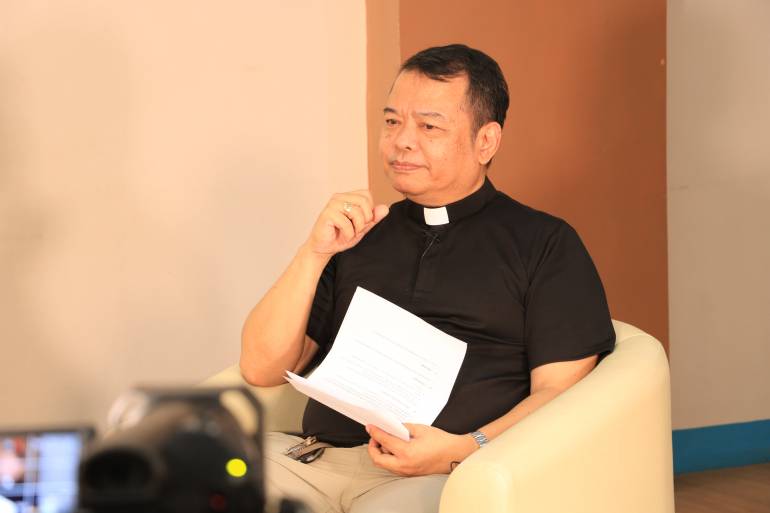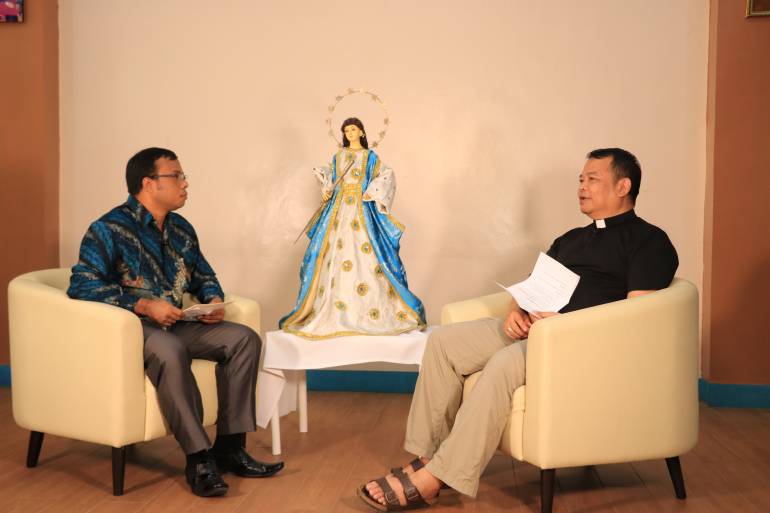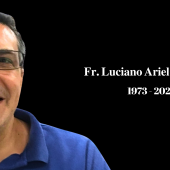Filipino Bishop: ‘Lay participation means more involvement in church's ministries’

In an exclusive interview with Radio Veritas Asia, Bishop Roberto Orendain Gaa of Novaliches talked about how laity participation in the church might lead to greater involvement in church ministries.
As the synod had suggested, he said, this kind of engagement should involve more consultation with the laity, which could mean more laity involvement in how parishes are run.
Going a step further, he said, "during the pre-synodal consultation, the process had already begun. But it has to be practiced again and again until it becomes a way of life.
“The laity is constantly involved through consultation and participation," he said.
"Since it is a process, it may take some time," he said, adding that “It may take a while before this process becomes really part of the church and it becomes a synodal church."
Bishop Gaa was born in Manila on October 4, 1962. He became a priest for the Manila Archdiocese on March 17, 2000. On September 23, 2000, he was named presbyter at the Manila Metropolitan Cathedral in Intramuros, Manila. He was a Licentiate in Spirituality student at the Pontifical Gregorian University in Rome, Italy, from 2003 to 2005.
The Diocese of Novaliches, where he is the bishop, has 1.2 million Catholics, in Metro Manila. The diocese has 24 parishes, 17 missions, and 73 clergy serving in them. Some of the other ministries of the diocese are feeding programs, scholarships, youth formation, and planning for families.
In terms of his vocation, the bishop surrenders himself to the guidance of the Holy Spirit, despite the fact that he may know many things.
"And that is also an opportunity for us to trust God more in this ministry. I need to trust God more than myself. And that is why prayer, consultation, and listening to people are so important, especially for those I know who pray a lot and have ministered to people a lot.
“That is an opportunity for me to both listen to and learn from God, our great teacher, and master," he said.
Asked about where he likes to see his diocese a few years from now, he said, "I'm looking forward to a clergy that is more vibrant and more youthful.”
The full interview, talking about his life, vocation, sinodality, and ministry in the diocese, is published on YouTube: https://youtu.be/ApWontHja18
Read the full transcript of the Interview below.

VOICE OF ASIAN BISHOPS
RVA Interview with Bishop Roberto Orendain Gaa of Novaliches, Philippines, by Fr. Kasmir Nema from Radio Veritas Asia.
Kasmir Nema: Bishop Gaa. You’ve been serving your diocese for nearly three years. Can you tell us about the progress of your diocese and your ministry, development and so on?
Bishop Gaa:
Well, in terms of progress, I came in before the pandemic. But barely seven months into that, into as a Bishop. There came the pandemic. And, I don't know if I was making any progress at that time, but at that time what I was going through is I was trying to get into the role of a Bishop in the diocese. And then all of a sudden the pandemic came. Then everything changed, the rules changed. The rules that I learned before the pandemic, they don't apply anymore. So we had. I had to. Fulfill the role of Bishop with new rules. Uh, with the old rules, not governing us anymore. So it was difficult at the time, very difficult. Uh. But, I say even if there were no rules that were applying.
The foundation as a priest is still there that my relationship with the priest had to be sort of concrete, had to be stable. It had to be consistent and steady. So that whatever happens to the diocese, I would know through them. And everything that had to be implemented through the diocese would be implemented through them as well. So, there were a lot of things that changed, but. What was? What was? What was still there was that my relationship with the priests? I don't know if I had really established a good relationship with the priests. But apparently, it continues to deepen even now during the pandemic.
Kasmir Nema: Let's go back to your ministry in the diocese. Bishop. Pope Francis has called us for this very important ongoing process of Synod, which is called as the participation of the lay people in particular. You know. If I ask you how the Synod process has been involved in your diocese and what is your thoughts on the involvement or role of the lay people in your diocese, Bishop.
Bishop Gaa:
Well, let me start with the synodality among priests. Even before I came in, it was part of the process that there is synodality among priests. Because in the diocese, the first week is devoted to the Curia meetings. The second week is devoted to clergy meetings. The 4th week is devoted to the Presbyteral Council meetings. When we look at that, anything that is brought up. During the Curia meetings, it is taken up. In the clergy meetings, questions are given, and clarifications are made.
But this is further deepened in the third week wherein there is a Vicariate meeting so that in the 5th, 4th week when we meet a Presbyteral Council, all these. Comments, all these feedbacks are taken up in the Presbyteral council meetings. So in each sense, there was already a single process going on among priests. And that is why I was confident that the process of synodality. There is a terminal image or stage of Synodality already among priests.
However, a great transition has to be made. In the parishes like what you said among the laity and that is really a challenge because priests are making are accustomed to making decisions on their own. Maybe even without consultation. Because that was part of how our parishes are traditionally run. But because of what Pope Francis is trying to do, he is injecting more consultation among the lay. And not just consultation, maybe even more involvement among the lay participation in how the parishes are being run, and that is why.
There is in that area is with a great transition or a great change will have to happen. And during the pre-synodal consultation, the process was already begun. But it has to be practiced again and again, again until it becomes a way of life. Where in there is constant participation of the lay through consultation, through participation. I'm not. I'm not. I don't think by 2023 we are done with all that. Since it is a process, it may take. It may take a while before all this process become really part of the church to become a synodal church.
Kasmir Nema: Talking about that overall situation of progress in your diocese, Bishop. Let me ask you about your vocation now as a Bishop. Can you tell us what are the most rewarding things? Is there any challenge also as your Bishop, your vocation?
Bishop Gaa:
Well, as I have begun earlier. I have barely set foot as a Bishop when the pandemic hit us. And everything changed. But, you know, I think the grace of the office is really there because there are a lot of things that I still don't know yet, surprisingly, maybe through the guidance of the Holy Spirit. We were able, we as a team. With the priests and maybe even the lay leaders.
We were able to cope with the radical change demanded of us. And maybe because of that. I would not attribute that to myself. Because I am barely at that time, barely a year old as a Bishop. And, I would dare say that the diocese was able to cope with the pandemic. It was able to be make it ends meet. And we were able, we continued to serve the people in the capacity that was turned over into turned over to me. So, I would say it's very challenging and it's, it demanded a lot from me and also from the priests.
Kasmir Nema: How do you find the role of young people in your diocese, Bishop?
Bishop Gaa:
Well, during this pandemic, old people cannot go out because they're not vaccinated, they're more prone, they're comorbidities are very high. That is the time, the young people were invited to participate in the affairs of the parishes. And that is why, when, that happened, that was the time that the parishes was blessed with the presence of the youth, not just youth as followers, as subordinates, but also as leaders.
And that is why this pandemic has been an opportunity for the youth to participate even more in the level of the parishes, but technically in the level of the diocese will much has to be desired. In the parishes, because of this pandemic, they are given the opportunity, the chance, to take on more serious role in the parishes.
Kasmir Nema: I believe you have a lot of things that's been a happening process in your diocese, Bishop. Having said all this. Where do you like to see in a few years from now, your diocese, Bishop? Any concrete plans and dreams?
Bishop Gaa:
The average age of the Diocese of the priests in the diocese is 56 years old. In five years, they will be 61. So we see that as a great concern and also as a great opportunity for us maybe to aggressively promote vocations and because of this. Because more and more young priests will be coming in, it means that the church, the clergy, will have a new face. We'll have a new personality. So in a way, I'm looking forward to clergy that is more vibrant, and more youthful. Maybe capable of talking to the youth of the diocese. So hopefully. Let's see. Let's see what happens.
Kasmir Nema: Any special plan or actions for the faithful, in particular?
Bishop Gaa:
Well, there is the Diocesan General Pastoral Assembly. And there are two things that we will do because of that general Diocese and General Pastoral assembly. First is to review our old vision and mission, which was formulated about 14 years ago. To evaluate how what was the, what has been the impact of the vision and mission in the life of the church. And we will do that through the data that we have gathered during the synodal consultation.
And that is a very vital, vital tool or instrument to evaluate. But not only that, that will also be the opportunity for the General Pastoral assembly to zero in on the priorities of the diocese, because we also have data. So in a way, it is a way of looking back, reviewing what we have done, and also a way of looking forward where would the diocese like to go based on the data that we have gathered during the synodal consultation.
Kasmir Nema: Bishop, our viewers are besides an Asian continent, but also our Asians in the diaspora in the US and in Europe. Do you have any messages for our viewers? I would like them to know your comments and your, perhaps your nice message for our viewers as a Bishop, as a shepherd.
Bishop Gaa:
I am still wondering why God called me as a Bishop. But also. But I said that maybe in jest, but also in reality, because how could God choose? A priest to us being a formator for about 3/4 of his life as a priest. I was that was the ministry, I know. And that is all I know. And that is why I entered into the picture of this diocese. I told them the first thing, the first thing I told them, especially the priests, I don't know anything. But maybe because of that, because of that emptiness.
I would also say that that was also an opportunity for me to learn a lot. That was an opportunity for me to absorb everything. Not to be affected by my biases, but to try to absorb everything. In absorbing everything, that was the time that I could learn also a lot of things. So what I might say. We may know a lot, but in a sense, we still need to be guided by the Spirit who knows everything. And that is also an opportunity for us to trust God more in this ministry.
I need to trust God more than myself. And that is why prayer, consultation, and listening to people, especially for those, especially to those whom I know are praying a lot and have ministered to people a lot. That is the opportunity for me to listen to God as well. And to learn from God. Who is a, who is our great teacher and master?
Radio Veritas Asia (RVA), a media platform of the Catholic Church, aims to share Christ. RVA started in 1969 as a continental Catholic radio station to serve Asian countries in their respective local language, thus earning the tag “the Voice of Asian Christianity.” Responding to the emerging context, RVA embraced media platforms to connect with the global Asian audience via its 21 language websites and various social media platforms.














